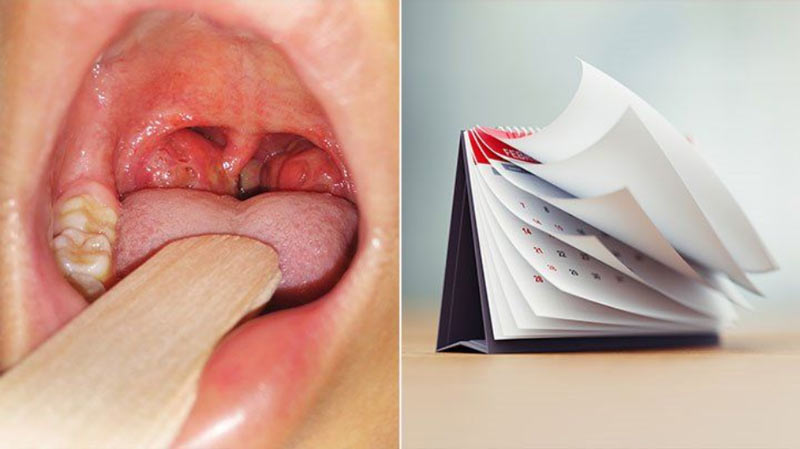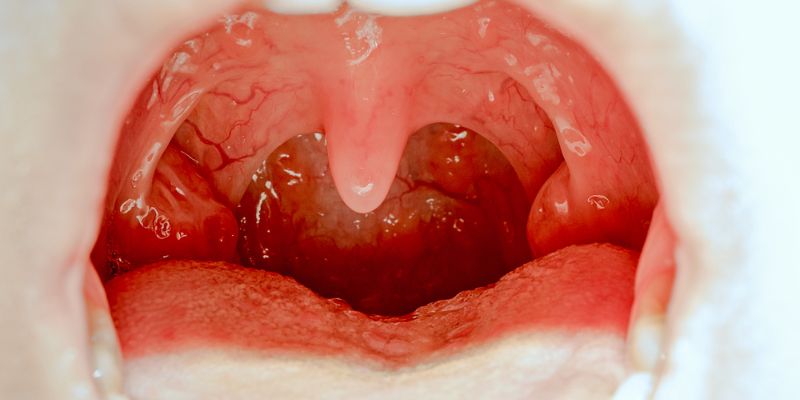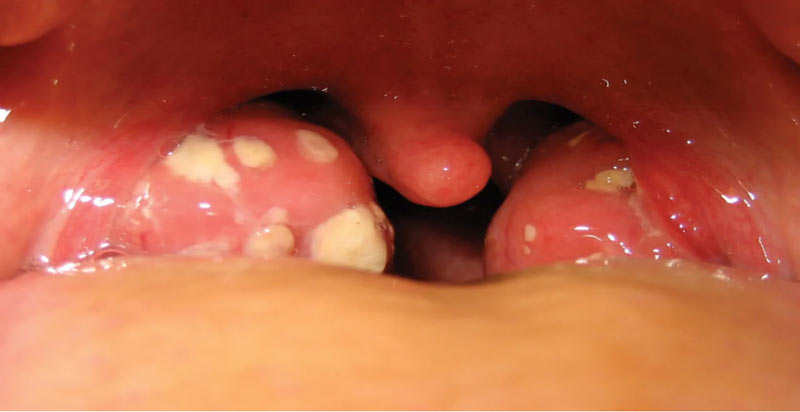Do you suffer from painful, chronic tonsillitis? If so, you’re not alone! Tonsillitis is one of the most common infections seen in childhood and affects both adults and children. It’s important to know what causes chronic tonsillitis so that you can get a better handle on how to manage it.
In this blog post, we explore the underlying causes of chronic tonsillitis and provide some tips for managing flare-ups. Read on to learn more about this persistent condition and strategies for optimizing health and reducing symptoms.
Why Chronic Tonsillitis Occurs
Chronic tonsillitis is when the inflammation of your tonsils (the glands located at the back of your throat) persists over time. Various factors, including bacterial and viral infections, autoimmune diseases, allergies, and environmental triggers, can cause it.
Bacterial tonsillitis is one of the most common causes of chronic tonsillitis--it occurs when bacteria like streptococcus or staphylococcus invade the sensitive tissue in your throat. Viral infections are also a common cause and usually occur alongside other cold or flu-like symptoms.
Autoimmune diseases can cause chronic inflammation in various body parts, including your throat. Allergies to certain foods or airborne irritants also lead to persistent inflammation well. Finally, environmental triggers such as air pollution or smoking can aggravate your throat and lead to chronic tonsillitis.
Main Causes of Chronic Tonsillitis
Bacterial Infections
Bacterial infections are one of the most common causes of chronic tonsillitis. Bacteria like streptococcus or staphylococcus can invade and infect the sensitive tissue in your throat, leading to inflammation and pain. Your doctor will likely recommend antibiotics to clear up any bacterial infection.
2. Viral Infections
Viral infections such as influenza, mononucleosis, measles, herpes simplex virus, adenovirus, and enteroviruses can cause inflammation and swelling in your throat, ultimately leading to chronic tonsillitis. Treatment for these infections usually includes a combination of antiviral medications and home remedies such as rest and fluids.
3 Autoimmune Diseases
Autoimmune diseases such as Hashimoto’s thyroiditis, Graves' disease, and Lupus are all associated with chronic inflammation in various body parts, including your throat. The body mistakenly attacks its tissues with autoimmune diseases, leading to persistent inflammation and pain.
4. Allergies &'' Sensitivities
Allergies to certain foods or airborne irritants such as dust mites or pet dander can cause chronic tonsillitis. Eating or breathing in these allergens can trigger an immune system response resulting in inflammation of the tonsils.
5 Environmental Triggers
Air pollution, smoking, and other environmental triggers, such as smog, can aggravate your throat and lungs leading to chronic tonsillitis. Reducing your exposure to these irritants can help reduce symptoms.
6. Acid Reflux
Gastroesophageal reflux disease (GERD) is a condition that causes acid to back up from your stomach into your throat, irritating the tonsils and leading to inflammation. Treating GERD with lifestyle changes and medications can help reduce symptoms of chronic tonsillitis.
7. Sinus Infections
Sinus infections, also known as rhinosinusitis, can cause inflammation in your throat, leading to chronic tonsillitis. Treatment for sinus infections usually includes antibiotics and saline nasal rinses.
8. Structural Abnormalities
Abnormalities in the structure of your throat or mouth, such as enlarged adenoids or an abnormally narrow airway, may lead to chronic tonsillitis. Treating these structural abnormalities with surgery can help reduce symptoms of chronic tonsillitis.
9. Deficiencies in vitamins
Vitamin C, D, and A deficits might weaken your immune system and cause throat irritation. Consuming a vitamin-rich, well-balanced diet or taking additional vitamins will help strengthen immunity and lessen the signs and symptoms of chronic tonsillitis.
10 Stress &'' Anxiety
Stress and anxiety can cause your body to release hormones that weaken the immune system, resulting in throat inflammation leading to chronic tonsillitis. Reducing stress through activities like yoga, meditation, or counseling may help improve your overall well-being and lessen symptoms associated with chronic tonsillitis.
Chronic vs. Recurrent Tonsillitis
Tonsillitis is an infection of the tonsils located at the back of the throat. It can cause inflammation and swelling in your throat, leading to pain and discomfort. Tonsillitis can be either chronic or recurrent.
Chronic tonsillitis is when an infection persists over a few weeks and causes severe symptoms such as fever, sore throat, difficulty breathing/swallowing, swollen lymph nodes, and even pus-filled lesions on the tonsils. Chronic tonsillitis is caused by bacterial infections (such as streptococcus) or virus infections (such as influenza). Treating chronic tonsillitis usually requires antibiotics or antiviral medications.
Recurrent tonsillitis is when a person experiences several episodes of tonsillitis within a year. It can be caused by the same bacteria or viruses that cause chronic tonsillitis, but it’s usually less severe and does not last as long. Common causes of recurrent tonsillitis include allergies, environmental triggers (such as air pollution), deficiencies in vitamins, stress, and anxiety.
Chronic Tonsillitis Treatment
Treating chronic tonsillitis requires a comprehensive approach involving medical treatment and lifestyle changes. Depending on the underlying cause of your chronic tonsillitis, your doctor may recommend antibiotics or antiviral medications.
Surgery may be necessary in some cases to treat structural abnormalities in the throat, such as enlarged adenoids or an abnormally narrow airway. If allergies are causing your tonsillitis, you may need to avoid certain allergens or take medications to reduce symptoms.
deficiencies in vitamins can also contribute to chronic tonsillitis and should be addressed through dietary changes or supplements. Eating a balanced diet rich in vitamins is important for optimizing immune health and reducing inflammation in your throat.
Symptoms of Chronic Tonsillitis
Chronic tonsillitis may cause unpleasant symptoms, such as sore throat, fever, difficulty swallowing or breathing, swollen lymph nodes, bad breath, and pus-filled lesions on the tonsils. Depending on the underlying cause of your chronic tonsillitis, these symptoms can come and go or persist for weeks at a time.
Home Remedies for Chronic Tonsillitis
In addition to medical treatment for chronic tonsillitis, several home remedies can help relieve symptoms. Drinking a lot of fluids is important for keeping your throat hydrated and promoting healthful mucus production, which helps reduce inflammation and irritation in your throat. Gargling with salt water can also help soothe an irritated throat.
FAQs
Q: How Can I Manage My Symptoms?
A: One effective way to manage symptoms associated with chronic tonsillitis is to maintain good general health habits. This includes eating a nutritious diet, exercising regularly, controlling stress, and avoiding smoking and drinking alcohol. Additionally, gargling with salt water or using a saline nasal rinse can help reduce inflammation caused by infection. If your symptoms are severe, talk to your doctor about taking over-the-counter medications such as ibuprofen or acetaminophen for pain relief.
Q: Are There Any Natural Remedies That Can Help?
A: Yes! Incorporating natural remedies into your treatment protocol may be beneficial for reducing flares of chronic tonsillitis. Some home remedies that relieve stress include drinking warm liquids (such as tea) throughout the day, consuming raw garlic cloves or honey to fight off bacteria, and eating probiotics yogurt. Additionally, some studies have shown that taking certain supplements, such as vitamin C and zinc, may reduce symptoms associated with chronic tonsillitis.
Q: When Should I See a Doctor?
A: If you suspect you are suffering from chronic tonsillitis, speak to a doctor immediately. Your doctor will be able to diagnose the underlying cause of the infection and provide appropriate treatment to reduce your symptoms and prevent further complications. Getting medical help as soon as possible is important because untreated or improperly treated tonsillitis can lead to serious health problems like kidney damage or blood-borne infections. If your symptoms don’t improve after a few days of home treatment, visit your healthcare provider.
Conclusion
Chronic tonsillitis is a persistent infection that can cause discomfort and interfere with daily life. Understanding the underlying causes of chronic tonsillitis can help you optimize your health and reduce flare-ups. Medical treatments, lifestyle changes, dietary adjustments, and natural remedies may be necessary to treat chronic tonsillitis effectively. If you suspect you suffer from this condition, speak to your doctor immediately for proper diagnosis and treatment.





